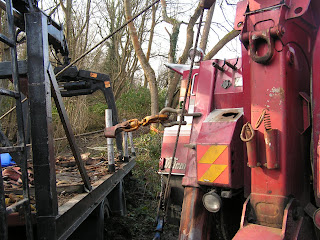 I needed some posts for my beds and I was running low on firewood so I decided to spend the day sorting it out. Matt is our main woodsman. He's a gardener and tree surgeon and he knows a great deal about wood.
I needed some posts for my beds and I was running low on firewood so I decided to spend the day sorting it out. Matt is our main woodsman. He's a gardener and tree surgeon and he knows a great deal about wood.The area we were working in yesterday was coppiced last year and Matt took down a few dead chestnut trees as well. Here's a bit of a gallery of the day. The next job will be putting the beds together. Freash horse manure will be arriving this weekend to make the hotbeds.
 When I arrived Matt, Julia and the Wwoofer (can't remember her name at the moment, I'll get it later) were putting some new tarpaulins on Matt and Julia's bender.
When I arrived Matt, Julia and the Wwoofer (can't remember her name at the moment, I'll get it later) were putting some new tarpaulins on Matt and Julia's bender.This is how you split a log for stakes, you bash one of the splitting wedges into the end of the log with a mallet.
Then you use the other wedge to force the split along the log.
Repeat until the wood is the right size.
These posts will then be split diagonally and pointed with the chainsaw to allow them to be bashed into the ground.
This area was coppiced last year the wood has been sitting for a year and is now ready to burn.
 Here's Matt showing me how to sharpen a chainsaw. He clamps the saw to a bench then gives each blade 3 swipes with a round file parallel to the mark on the blade filing each alternate blade (The ones pointing in the appropriate direction) then he turns the saw around, clamps it again and does the same to the other side but doing 4 swipes because the left hand is weaker. He then takes a flat file and does one swipe on each of the depth nubs of metal in between each blade (I'm sure it has a proper name but I don't know what it is yet).
Here's Matt showing me how to sharpen a chainsaw. He clamps the saw to a bench then gives each blade 3 swipes with a round file parallel to the mark on the blade filing each alternate blade (The ones pointing in the appropriate direction) then he turns the saw around, clamps it again and does the same to the other side but doing 4 swipes because the left hand is weaker. He then takes a flat file and does one swipe on each of the depth nubs of metal in between each blade (I'm sure it has a proper name but I don't know what it is yet).He then made sure everything was clean and properly tensioned and put it back together.
It's snowing today again so more tomorrow hopefully.







































